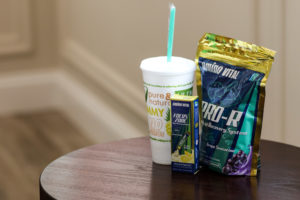Golf nutrition plans are typically consistent across all age groups, so the lifestyle will look similar to both professional golfers and junior golfers.
Golf nutrition programs are not diets; while limiting sugar and trans fats are well-known health boosters, Junior Golf Hub wants to dive more into the education of nutrition for golfers and some healthy habits for tournament season.
Between well-balanced eating habits, water and correct timing, you are well on your way to giving your body the proper fuel to perform at its best during golf tournament season.
The ABC’s of Golf Nutrition

In order to have a well-balanced meal, it helps to know what constitutes that meal; that’s where the top golf nutrition plan comes in. The goal is to have a healthy balance of energy throughout the day, along with tons of water to keep your body moving properly and your mind clear.
Calories for the Ultimate Energy
A calorie is defined as energy used in the body for daily function, exercise and any other activity. Calories are broken down by macronutrients.
Macronutrients Determine Well-Balanced Meals
Macronutrients are divided into three categories:
- Proteins
- Carbohydrates
- Fats
All three macronutrients require appropriate amounts of each to maintain a well-balanced diet. You’ll find these three categories measured in grams (g).
Protein Recovers Your Muscles
Made up of amino acids, protein is essential in your diet for muscle repair, growth and recovery. The body breaks down muscle tissue during exercise, and both a strong golf nutrition plan and cool-down recovery plan repair and strengthen those muscles.
1 gram of protein is equivalent to 4 calories. Athletes require .64-.82 grams of protein per pound of body weight, or about 12-15% of your total caloric intake each day. Protein can come from meat as well as beans and other lentils.
Carbohydrates Are Great for Energy
Carbohydrates, often referred to as carbs, are our bodies’ preferred source of energy. There are two different types:
- Simple carbohydrates
- Complex carbohydrates
Simple carbohydrates are found in sugary foods, from fruit to candy. These carbs hit the body quickly, and the body uses them for instant energy. The preferred timing for simple carbohydrates is after a workout when you want to put energy into your bloodstream and muscles for a faster recovery.
Complex carbohydrates include whole grains, beans and sweet potatoes, for example. Your body slowly absorbs these carbs, providing you with consistent energy levels over a long period of time.
1 gram of a carbohydrate equals 4 calories. Athletes require carbohydrates to be around 55-60% of their caloric intake.
Fats Build Your Energy Reserve
Fats are our backup energy source when carbohydrates are not readily available. “Good” fats include monounsaturated and polyunsaturated fats that are found in foods like olive oil, avocados, nuts, peanut butter, seeds and salmon. Trans fats found in processed food, such as a Big Mac, are not good nutrition for golf.
1 gram of fat is equal to 9 calories. Fat comprises 25-30% of an athlete’s total caloric intake.
Golf Nutrition During Your Round
Now that you know what kinds of macronutrients to include in your golf nutrition plan, let’s discuss the best time to eat each leading up to, during and after your golf round.
Pre-Round Golf Nutrition
Before you get to the golf course, it’s important to have your pre-round golf nutrition in place. Consume a well-balanced meal containing complex carbohydrates and an adequate amount of protein about two hours before your tee time. This will give you time to digest your food and reap the benefits before you play.
Example pre-round meals:
- 2-3 eggs
- 2 pieces of whole wheat/whole grain toast
- 1 cup of fruit
- Water
Mid-Round Golf Nutrition
A mix of complex and simple carbohydrates in your snacks throughout the round will maintain your energy levels from your breakfast. You’ll want to avoid simple carbohydrates with high sugar content because the sudden spike will cause a sudden crash in energy.
Example of mid-round snacks:
- Fruit and vegetables
- Whole wheat crackers
- Oat/whole grain bars
- Protein cookie
- Electrolyte powders for your water bottle, water
Post-Round Golf Nutrition
While a post-round golf nutrition plan is often neglected, it’s an important step for your golf game, especially if you’re playing another round the next day. After four to five hours of walking, you are burning an average of 1,500-2,000 calories while only ingesting a quarter of that during the round.
Replenishing the body of those essential nutrients is crucial, especially after such a workout. You’ll want to ensure protein, healthy fats and simple and complex carbohydrates are incorporated into your post-round meal.
Example post-round meal components:
- 4 oz. chicken
- 1 sweet potato
- Vegetables
- 1 cup of fruit
- Handful of almonds
- Water
Nutrition for Golf Includes Water

Water is crucial to all golf nutrition plans – really any nutrition plan. Performance can be severely diminished by dehydration, so it’s important to drink plenty of water before, during and after play.
If you take your body weight and divide it by two, that’s how many ounces of water you’ll want to drink throughout your round. For example, if you weigh 150 pounds, you’ll want to drink approximately 75 ounces of water. Drinking this water consistently throughout your pre-round meal all the way till you walk off the golf course will keep your body hydrated and your mind focused.
This simple equation can also be applied to your water intake on non-tournament days. You’ll still want to consume half your body weight in ounces throughout the day. If you’re thirsty, you’re already dehydrated.
While you’re preparing for or are in the midst of your college golf recruiting process, taking these simple steps can yield some amazing results on the golf course. Prioritizing your health through a top golf nutrition program can have a huge impact on your game.
Disclaimer
All information presented and written within this article are intended for informational purposes only. You should not rely on this information as a substitute for, nor does it replace, professional medical advice, diagnosis, or treatment. If you have any concerns or questions about your health, you should always consult with a physician or other health-care professional.

